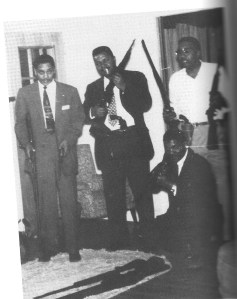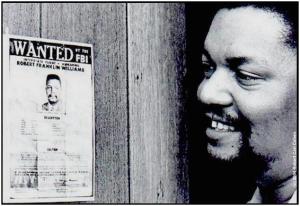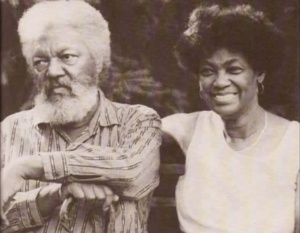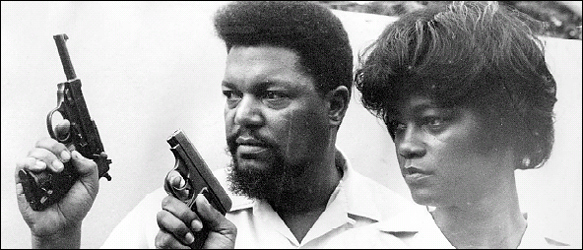Martin Luther King, Jr. preached nonviolence. Robert F. Williams didn’t have that option.
Videos by Rare
As the head of the North Carolina NAACP during the civil rights era, World War II veteran Williams stockpiled weapons and trained his black neighbors to fight the Ku Klux Klan.
For Williams, it was literally do or die.
If government is supposed protect citizens and their liberties, what do you do when government either refuses or passively encourages violence through inaction?
Hip-hip journalist Davey D explains, “At the time, the Justice Department, the Federal Bureau of Investigation and local law enforcement refused to provide protection to the black community while supporting and enabling perpetrators of violence in (Williams) hometown of Monroe, North Carolina.”
In those days, local government or law enforcement were often indistinguishable to the black community from the KKK. Just how many men hiding beneath those white sheets were also on the county council or in the police department?
In 1946, the black community of Monroe, under Williams’ leadership, had had enough. The New York Times reported that Williams formed “the Black Guard, after seeing Klan members make a black woman dance at gunpoint ‘like a puppet.”
Davey D’s hiphopandpolitics.com gives us another terrible snapshot of what gave rise to Williams’ militia:
Bennie Montgomery, a fellow vet and friend of Williams, killed a white man in self-defense. The white man had assaulted him and tried to slit his throat because he asked for his wages at noon instead of at the end of the day. The Ku Klux Klan wanted to come to town for revenge but authorities shipped Montgomery out of town, convicted him and executed him in the gas chamber. When Montgomery’s body was shipped back to his family the Klan said his body belonged to them. They said they was going to come and take the body drag it up and down the streets and then hang and burn it.
Williams and fellow vets made a defense plan at the local barbershop. When the Klan motorcade pulled up in front of the Harris Funeral Home, 40 black men leveled their rifles, taking aim at the line of cars. Not a shot was fired; the Klansmen simply weighed their chances and drove away.
The primary purpose of the Second Amendment has never been simply to hunt or even just to protect one’s property. It was for Americans to protect themselves against tyrannical government.
For gun control advocates, saying citizens must arm themselves against government might sound extreme or perhaps like something that should be relegated to the 18th century.
But relatively speaking, Jim Crow didn’t end that long ago.
Robert Williams might’ve understood the true purpose of the Second Amendment better than any American of the last half-century.
Williams told a critical NAACP convention in 1959, “Tom Paine, Washington, Jefferson, and Patrick Henry were all honorable men who are supposed to represent the true spirit of America. These noble men advocated violence as a vehicle of liberation…”
Williams added, “We as men should stand up as men and protect our women and children. I am a man, and I will walk upright as a man should. I will not crawl.”
Crawl, he did not. Biographer Timothy B. Tyson noted of Williams, “Threatened with death, he walked down the street carrying a pistol, which would be a normal white, Southern thing to do.”
Like Dr. King and other civil rights leaders, Williams was monitored and harassed by the government and eventually left the country with his wife Mabel, receiving exile in both Cuba and China. He became a hero to the growing black power movement in the United States, particularly Black Panther leaders Huey Newton and Bobby Seale.
While Williams, the Panthers and similar groups adopted hard left or socialist politics, their promotion of armed resistance was born of a long history of gun control policies used to oppress African-Americans.
A prime example was Martin Luther King, Jr.’s difficulties in legally obtaining a gun. According to UCLA law professor Adam Winkler, “In 1956, after King’s house was bombed, King applied for a concealed carry permit in Alabama. The local police had discretion to determine who was a suitable person to carry firearms. King, a clergyman whose life was threatened daily, surely met the requirements of the law, but he was rejected nevertheless.”
Winkler added, “At the time, the police used any wiggle room in the law to discriminate against African Americans.”
After King’s assassination, Congress passed and President Lyndon Johnson signed the Gun Control Act of 1968—a racist law created out of fear of black urban backlash—which was also the first major federal restrictions put on firearms since the 1930s.
“These laws,” Winkler said, “fueled the rise of the modern gun rights movement, which self-consciously borrowed tactics from the civil rights movement.”
While gun control laws in the United States have racist origins, it seems today’s Second Amendment advocates owe civil rights activists more than they might realize. It is a history worth revisiting.
In July, rapper and actor Ice-T made a point of saying that gun rights are civil rights.
This was something Robert F. Williams always knew. It is something all Americans should never forget.






